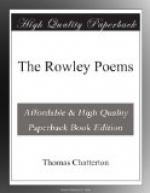I ryse wythe the sonne,
Lyche hym to dryve the wayne[61],
And eere mie wurche is don
I synge a songe or twayne[62].
70
I followe the plough-tayle,
Wythe a longe jubb[63] of ale.
Botte of the maydens, oh!
Itte lacketh notte to telle;
Syr Preeste mote notte crie woe,
75
Culde hys bull do as welle.
I daunce the beste heiedeygnes[64],
And foile[65] the wysest feygnes[66].
On everych Seynctes hie daie
Wythe the mynstrelle[67] am I seene,
80
All a footeynge it awaie,
Wythe maydens on the greene.
But oh! I wyshe to be moe greate,
In rennome, tenure, and estate.
SYR ROGERRE.
Has thou ne seene a tree uponne
a hylle, 85
Whose unliste[68] braunces[69]
rechen far toe fyghte;
Whan fuired[70] unwers[71]
doe the heaven fylle,
Itte shaketh deere[72] yn
dole[73] and moke affryghte.
Whylest the congeon[74] flowrette
abessie[75] dyghte[76],
Stondethe unhurte, unquaced[77]
bie the storme: 90
Syke is a picte[78] of lyffe:
the manne of myghte
Is tempest-chaft[79], hys
woe greate as hys forme,
Thieselfe a flowrette of a
small accounte,
Wouldst harder felle the wynde, as hygher
thee dydste mounte.
[Footnote 1: lodges, huts.]
[Footnote 2: cottages.]
[Footnote 3: servant, slave, peasant.]
[Footnote 4: if.]
[Footnote 5: a contraction of them.]
[Footnote 6: naked, original.]
[Footnote 7: nature.]
[Footnote 8: liking.]
[Footnote 9: might. The sense of this line is, Would you see every thing in its primaeval state.]
[Footnote 10: wise-egger, a philosopher.]
[Footnote 11: knowledge.]
[Footnote 12: sporting.]
[Footnote 13: answered.]
[Footnote 14: aid, or help.]
[Footnote 15: work.]
[Footnote 16: drink.]
[Footnote 17: a hood, or covering for the back part of the head.]
[Footnote 18: guilded.]
[Footnote 19: borders of gold and silver, on which was laid thin plates of either metal counterchanged, not unlike the present spangled laces.]
[Footnote 20: lord.]
[Footnote 21: sultry.]
[Footnote 22: car.]
[Footnote 23: seed.]
[Footnote 24: quickly, presently.]
[Footnote 25: gather.]
[Footnote 26: grow.]
[Footnote 27: fate.]
[Footnote 28: a contraction of wither.]
[Footnote 29: dried.]
[Footnote 30: sweet.]
[Footnote 31: flower.]
[Footnote 32: equal.]
[Footnote 33: coward.]




